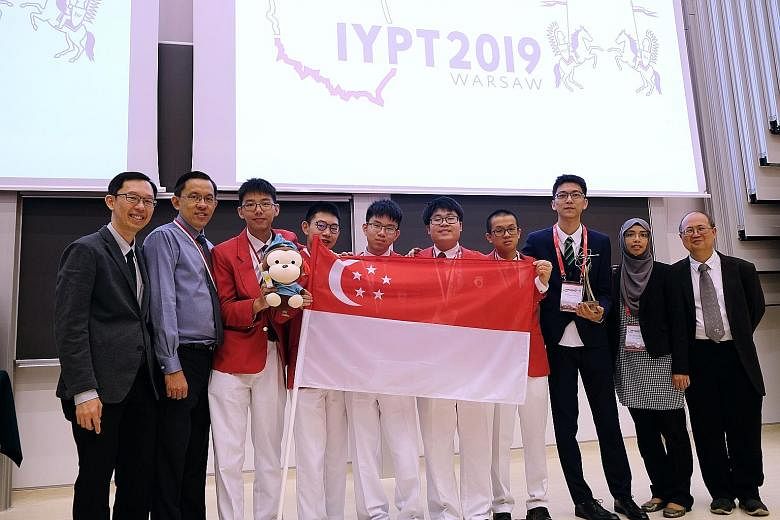Students from the Republic have figured out the formula for winning the International Young Physicists Tournament, bagging their seventh straight title in a competition that had them take on students from 33 other countries or territories.
The five-student team - comprising four from Raffles Institution and one from NUS High School of Mathematics and Science - emerged champions at the 32nd iteration of the event held in Warsaw, Poland, from July 6 to 13. The tournament, touted as the "Physics World Cup", is organised around "physics fights" that mimic discussions at research conferences, where participants present their research and provide feedback on other teams' work.
Students from Singapore also did well in the International Olympiads for the sciences, mathematics and informatics.
At the 50th International Physics Olympiad held in Tel Aviv, Israel, from July 7 to 15, Singapore bagged two gold and two silver medals, and one bronze medal to place joint eighth out of 78 countries or territories. Students had to conduct experiments on the thermal and electrical properties of different metals, among other things.
Meanwhile, in Szeged, Hungary, another team from Singapore won three gold medals and one silver medal in the 30th International Biology Olympiad from July 14 to 21, placing joint fourth out of 72 countries or territories. Students performed a range of tasks, such as dissecting and examining chicken parts.
Over in Paris, Singapore secured two gold and two silver medals at the 51st International Chemistry Olympiad from July 21 to 30, placing 14th out of 80 countries or territories. Tasks included the chemical analysis of wine constituents using methods such as redox titration and spectroscopy.
At the 60th International Mathematical Olympiad held in Bath, Britain, from July 11 to 22, Singapore won two gold and four silver medals, placing eighth among 112 countries or territories.
Students tackled challenges in the areas of algebra, geometry, combinatorics, and number theory.
And at the 31st International Olympiad in Informatics in Baku, Azerbaijan, from Aug 4 to 11, Singapore clinched one gold medal, one silver and one bronze to place joint 15th out of 87 countries or territories. During the competition, students had to solve computational problems which tested their ability to design and implement efficient algorithms and data structures.
The Education Ministry said that participation in these international competitions was a joint effort between the ministry and several institutions and organisations, including the Singapore Mathematical Society.


